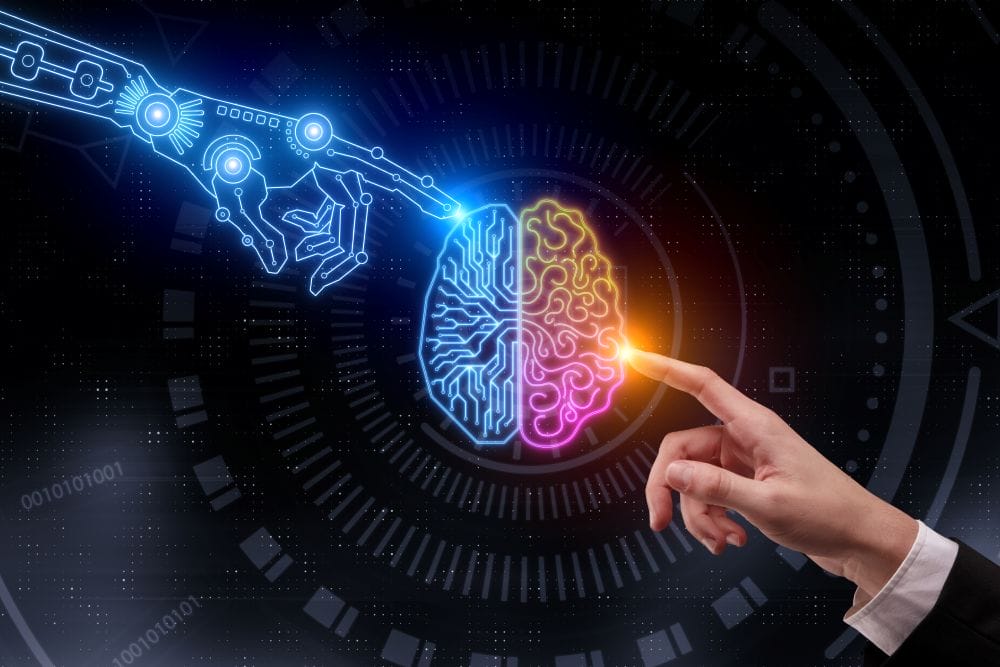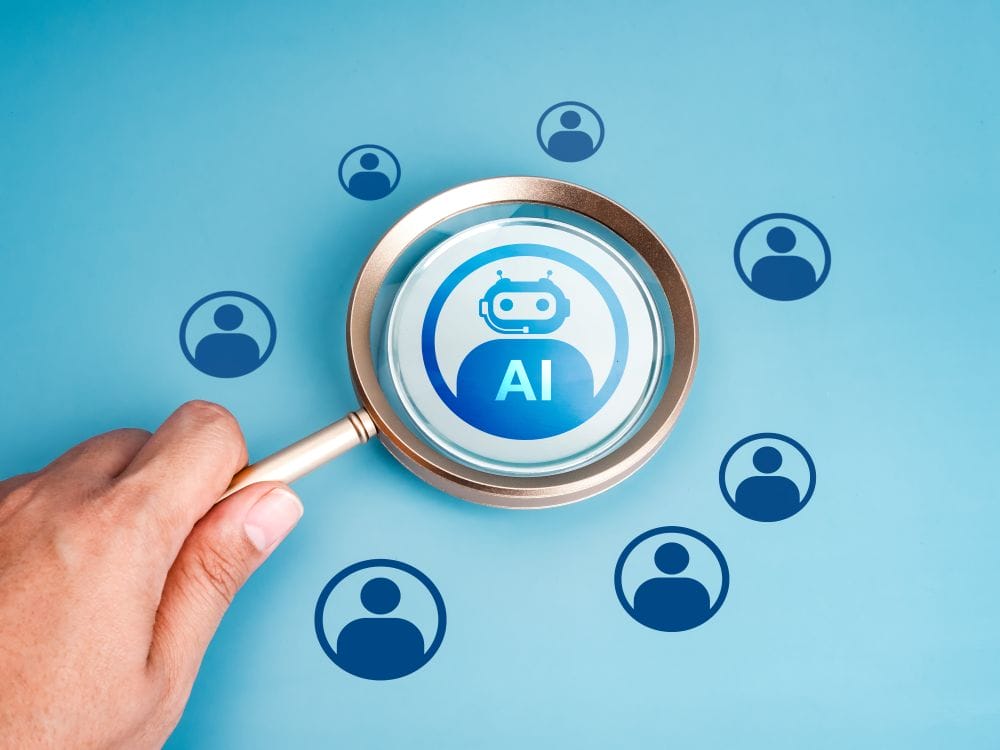Using artificial intelligence when hiring is revolutionizing recruitment. In this article, we’ll explore how AI is used in hiring, the benefits it brings, and the challenges it presents. Stay informed about the top trends in AI hiring to enhance your recruitment strategy.
Key Takeaways
Artificial intelligence in hiring helps automate repetitive tasks like resume screening and scheduling, allowing recruiters to focus on strategic decision-making.
Using AI can speed up recruitment, enhance candidate experiences, and reduce human bias by focusing on skills rather than demographics.
Despite its benefits, companies need to address risks like data privacy and potential bias in AI systems to maintain fairness and transparency.
Understanding Artificial Intelligence in Hiring
Artificial Intelligence in hiring refers to the application of advanced technologies to streamline and enhance various aspects of the recruiting process. At its core, AI in hiring aims to automate repetitive tasks, analyze large datasets, and provide valuable insights to HR professionals and hiring managers.
The integration of AI into hiring processes is not about replacing human judgment but rather complementing it. Artificial Intelligence tools act as assistive technologies that simplify and expedite time-consuming tasks like screening resumes, scheduling interviews, and even conducting initial candidate assessments. This allows hiring managers to focus more on strategic decision-making and building relationships with qualified candidates.
AI allows companies to significantly enhance efficiency and speed in their recruitment process over traditional methods. AI-powered tools can sift through thousands of resumes in a fraction of the time it would take a human recruiter, ensuring that only the most qualified job candidates make it to the next stage. This not only saves time but also reduces the chances of overlooking potential talent.
Artificial Intelligence Technology
AI in hiring encompasses various technologies, including machine learning algorithms and natural language processing.
Machine learning algorithms are designed to analyze large volumes of data and make predictions about a job candidate’s suitability for a role based on patterns and trends. For instance, these algorithms can identify key skills and experiences from resumes, matching them with job descriptions to find the best fit.
Natural language processing, on the other hand, allows machines to understand and generate human language, which is crucial for interpreting resumes and other textual data. This technology enables AI tools to analyze the language used in resumes, cover letters, and even job postings, ensuring that the recruitment process is as efficient and accurate as possible.
How AI Integrates into the Hiring Process
Artificial intelligence integrates seamlessly into various stages of the hiring process, offering innovative solutions that enhance efficiency and accuracy. One notable application is AI-powered interview tools that analyze candidates’ voice and facial expressions during video interviews to assess their suitability for roles. These automated tools not only enhance the hiring process but also reduce the human effort required during interviews.
AI chatbots play a crucial role in the initial stages of recruitment by conducting preliminary screenings and scheduling job interviews. These chatbots engage with candidates in real-time, providing instant responses and ensuring a smooth and efficient interview process.
AI-based sourcing solutions assist recruiters in quickly locating and connecting with qualified applicants, significantly reducing the time and effort involved in sourcing candidates.
Automated scheduling tools powered by AI further streamline the interview process by finding mutually convenient times for both candidates and interviewers, eliminating the need for back-and-forth communication. This not only saves time but also enhances the overall candidate experience by making the recruiting process more organized and efficient.
Benefits of Using AI in the Recruitment Process

From enhancing efficiency and speed to reducing human bias and improving the candidate experience, AI offers a comprehensive solution to many of the challenges faced by HR professionals and hiring managers throughout the entire hiring process.
One of the most significant advantages of AI in hiring is its ability to streamline and automate various administrative tasks. This allows recruiters to focus on more strategic activities, such as engaging with candidates and making informed hiring decisions.
AI improves the accuracy of these decisions, reducing the risk of costly mis-hires and ensuring that companies find the most qualified candidates for their roles.
AI also improves the candidate experience by offering faster responses and more personalized interactions. Candidates appreciate the efficiency and responsiveness of AI algorithms-powered tools, which can significantly improve their perception of the hiring process and the organization as a whole.
Enhancing Efficiency and Speed
AI-powered tools can automate communication, schedule interviews, and provide swift feedback, allowing recruiters to focus on more strategic activities. This not only saves time and resources but also leads to more effective recruitment teams.
Additionally, AI hiring tools are particularly effective for screening candidates in high-volume recruitment scenarios. By quickly analyzing resumes and identifying suitable candidates, AI ensures that only the most qualified candidates make it to the next stage of the hiring process, thereby enhancing overall efficiency and speed.
Reducing Human Bias
Traditional hiring processes are often influenced by unconscious biases related to age, gender, race, and other demographic factors. AI can help mitigate these biases by focusing solely on candidates’ qualifications and experience.
For example, AI systems can be trained to disregard demographic details and evaluate job seekers based on their skills and qualifications. Tools like Textio enhance job postings by optimizing language to promote diversity and reach a wider audience. This not only creates a more equitable hiring process but also helps companies build diverse and inclusive teams.
Improving Candidate Experience
AI-powered chatbots offer personalized feedback and real-time engagement, ensuring candidates receive timely and relevant information. This level of responsiveness can significantly improve job seekers perception of the hiring process and the organization.
AI also streamlines the application process, making it more efficient and enjoyable for candidates. AI offers engaging ways for candidates to showcase their abilities, resulting in a positive experience from start to finish.
Potential Risks and Challenges of AI in Hiring

While AI offers numerous benefits, it also presents several risks and challenges that need to be addressed. These include data privacy issues, lack of transparency, and the potential for exacerbating existing biases.
One of the primary concerns is the potential for AI to overlook valuable candidates due to technology limitations. Over-reliance on these tools can lead to impersonal candidate experiences, and AI-driven selection criteria may result in candidate mismatches. Also, candidates may feel undervalued and disengaged if they perceive the recruitment process as too automated and lacking a human factor.
Data Privacy and Legal Concerns
Data privacy and legal concerns are paramount when implementing AI in hiring. To date, employers are the most specifically regulated entities under AI-related laws.There are two specific regulatory areas to consider;
The FTC Act, which prohibits “unfair” and “deceptive” use of AI tools.
The EEOC, who guide or regulate employers’ use of AI when making employment decisions.
The EEOC claims that employer’s use of AI tools may be in violation of Title VII of the Civil Rights Act (discrimination against protected classes). This concerns the Americans with Disabilities Act and ensuring the employer provides “reasonable accommodation” for those with disabilities.
A few examples:
A hiring process that includes an AI-based video interview without provide a way for accommodating someone with hearing or sight disabilities.
An employer relies on AI tools that screen out candidates based on resumes that show gaps in employment history. This process could then screen out those that might naturally have employment gaps due to their disability.
State and City Law Examples
It is very important to research your own state’s laws or consult legal advice if you use AI for hiring. Currently 19 states have AI laws governing hiring practices and 5 other states have laws being developed. Here are some examples of current state and city laws and hiring practices:
Illinois: Prohibits employers from using AI that discriminates against protected classes. Also requires employers using AI-based video interview tools to obtain the applicants’ consent.
Maryland: Requires employers to obtain the applicants’ consent to use facial recognition technology during job interviews.
New York City: Employers using AI to make employment decisions are required to conduct a bias audit and provide notices to job candidates disclosing their use of AI for hiring.
It is essential for human resources practices regarding AI to comply with ethical guidelines and legal standards. Regular monitoring of regulatory changes and clear communication with candidates about the use of AI and data collection practices are crucial to maintain trust, transparency, and operate within the law.
Transparency and Accountability
A lack of transparency in AI decision-making can result in difficulties in understanding decision rationale, challenges in auditing, and improving processes. Regular audits by diverse teams or third-party experts help maintain ethical hiring standards and ensure AI based tools are functioning fairly.
Human perspective can identify unique qualifications that AI might overlook. Combining AI with human judgment ensures a balanced approach to hiring, promoting transparency and accountability in the recruitment process.
Risk of Exacerbating Bias
The data quality used for training plays a significant role in determining the results generated. If the training data reflects societal biases, the AI models will likely reinforce these biases, potentially leading to unfair hiring practices. A notable example is Amazon’s candidate screening tool, which was called out for disqualifying female applicants based on biased data.
To mitigate this risk, regular audits of AI tools should be performed to ensure non-discriminatory practices and identify any biases in the system. Companies must also use unbiased algorithms and quality data to promote equity and equality in hiring.
Best Practices for Implementing AI in Your Hiring Process
Integrating AI into the hiring process requires a strategic approach to ensure it complements existing processes and enhances overall recruitment efficiency. Transparency, fairness, and accountability are key considerations for using AI in hiring. By following best practices, companies can leverage AI to improve their recruitment efforts while minimizing potential risks.
Ensuring Compliance with Regulations
AI based tools must adhere to various anti-discrimination laws to avoid potential lawsuits and ensure fair hiring practices. Companies must also comply with data protection laws such as GDPR and local privacy laws, regularly aligning their AI tools with evolving legal standards.
Promoting Transparency and Consent
The Illinois Artificial Intelligence Video Interview Act mandates specific protocols before using AI for video interviews, ensuring candidates are aware and consent to the process.
Clear communication about AI’s role in recruitment helps build trust and respect for candidates’ privacy. Companies should inform candidates about the data being collected and how it will be used.
Regular Audits for Fairness
Regular audits of AI systems ensure fairness and mitigate biases in the hiring process. These audits help organizations identify and address any hidden biases in their recruitment processes, promoting equity and diversity.
Vendors should also ensure that their algorithms are fair and consistent, providing reliable results. This enhances the quality of hires and builds trust and confidence in the recruitment process.
Popular AI Tools for Recruitment

Whether it’s screening resumes, engaging with candidates through chatbots, or using predictive analytics for talent assessment, AI tools offer a range of functionalities to streamline the talent acquisition process and the hiring process.
AI-Powered Resume Screeners
AI-powered resume screeners are a game-changer in the hiring process. Tools like Phenom AI offer features such as AI-generated fit scores and personalized job recommendations. These features enhance candidate sourcing and ensure that the most relevant candidates are identified quickly.
AI screening tools use machine learning algorithms to identify key skills and experiences that closely match the requirements of job descriptions, significantly reducing the time recruiters spend on screening resumes and improving accuracy.
Chatbots for Candidate Engagement
AI chatbots are revolutionizing candidate engagement by providing real-time communication and instant responses during the hiring process. Paradox’s Olivia chatbot, for example, can communicate in over 100 languages, making it accessible for diverse candidate pools and ensuring that candidates receive timely feedback and information throughout their application process.
These chatbots enhance the candidate experience and free up recruiters’ time by handling routine inquiries and scheduling interviews. AI chatbots automate routine tasks to keep candidates engaged and informed, greatly enhancing their overall experience with the hiring process.
Predictive Analytics for Talent Assessment
Predictive analytics in hiring uses AI to forecast the future performance of applicants based on various assessments.
Tools like AI-powered talent assessments offer gamified assessments, personality and skill assessments, culture fit evaluations, and social skills assessments, providing a comprehensive evaluation of candidates. These automated tools focus on measuring candidate competency and personality traits, emphasizing potential rather than past experience.
Seamless integration of AI assessments with existing systems ensures a smooth workflow and improves the accuracy of hiring decisions. This improves the quality of hires and helps companies build strong, capable teams that align with their organizational culture and goals.
- Hardcover Book
- Wolford, Mike (Author)
The Future of AI in Hiring
The future of AI in hiring is bright, with technological advancements poised to further transform the recruitment landscape. However, as AI becomes more integrated into hiring, it’s essential to address ethical considerations and ensure responsible use.
Clear accountability mechanisms for hiring decisions, ethical collection and utilization of candidate data, and understanding when to override AI decisions are crucial for maintaining trust and fairness in the recruitment process.
Advancements in AI Technology
Advancements in AI technology will continue to revolutionize the hiring process. AI tools are becoming more sophisticated, with the ability to make better data-driven decisions and provide more accurate candidate assessments. HR managers are hopeful about these advancements, anticipating significant improvements in recruitment efficiency and effectiveness.
Generative AI technologies, for instance, will enable recruiters to quickly summarize candidate qualifications, making the screening process faster and more efficient. With substantial budget increases for AI-powered recruiting tools, these emerging technologies are set to transform the hiring landscape and help companies find the best talent acquisition.
Ethical Considerations and Responsible AI
As AI becomes more prevalent in hiring, addressing ethical considerations is crucial. Candidates often express distrust in AI hiring decisions due to concerns about fairness and transparency. It’s essential to establish clear accountability mechanisms for hiring decisions and ensure the ethical collection, storage, and utilization of candidate data.
Responsible use of AI involves understanding its capabilities and limitations, as well as knowing when to override AI decisions to ensure fairness. Addressing ethical implications helps companies build trust with candidates and ensure their AI-driven recruitment processes are effective and fair.
Summary
In summary, AI is transforming the hiring process by enhancing efficiency, reducing bias, and improving the candidate experience. By leveraging AI tools, companies can streamline their recruitment efforts, make more accurate hiring decisions, and build diverse and inclusive teams. However, it’s essential to address the potential risks and challenges associated with AI, such as data privacy concerns and the risk of exacerbating bias.
By following best practices, ensuring compliance with legal standards, promoting transparency, and conducting regular audits, companies can harness the power of AI to revolutionize their hiring processes. The future of AI in hiring is bright, and with responsible implementation, it promises to create a more efficient, equitable, and enjoyable recruitment experience for all.
As an Amazon Associate, The Job Blog earns from qualifying purchases. Last update on 2025-04-03 / Affiliate links / Images from Amazon Product Advertising API




